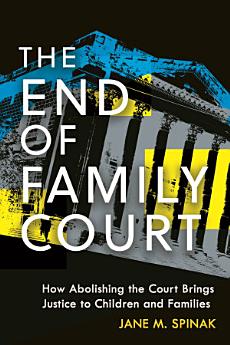The End of Family Court: How Abolishing the Court Brings Justice to Children and Families
Jane M. Spinak
Aug 2023 · Families, Law, and Society Book 20 · NYU Press
Ebook
385
Pages
family_home
Eligible
info
reportRatings and reviews aren’t verified Learn More
About this ebook
Explores the failures of family court and calls for immediate and permanent change
At the turn of the twentieth century, American social reformers created the first juvenile court. They imagined a therapeutic court where informality, specially trained public servants, and a kindly, all-knowing judge would assist children and families. But the dream of a benevolent means of judicial problem-solving was never realized. A century later, children and families continue to be failed by this deeply flawed court.
The End of Family Court rejects the foundational premise that family court can do good when intervening in family life and challenges its endless reinvention to survive. Jane M. Spinak illustrates how the procedures and policies of modern family court are deeply entwined in a heritage of racism, a profound disdain for poverty, and assimilationist norms intent on fixing children and families who are different. And the court’s interventionist goals remain steeped in an approach to equity and well-being that demands individual rather than collective responsibility for the security and welfare of families.
Spinak proposes concrete steps toward abolishing the court: shifting most family supports out of the court’s sphere, vastly reducing the types and number of matters that need court intervention, and ensuring that any case that requires legal adjudication has the due process protections of a court of law. She calls for strategies that center trusting and respecting the abilities of communities to create and sustain meaningful solutions for families. An abolitionist approach, in turn, celebrates a radical imagination that embraces and supports all families in a fair and equal economic and political democracy.
At the turn of the twentieth century, American social reformers created the first juvenile court. They imagined a therapeutic court where informality, specially trained public servants, and a kindly, all-knowing judge would assist children and families. But the dream of a benevolent means of judicial problem-solving was never realized. A century later, children and families continue to be failed by this deeply flawed court.
The End of Family Court rejects the foundational premise that family court can do good when intervening in family life and challenges its endless reinvention to survive. Jane M. Spinak illustrates how the procedures and policies of modern family court are deeply entwined in a heritage of racism, a profound disdain for poverty, and assimilationist norms intent on fixing children and families who are different. And the court’s interventionist goals remain steeped in an approach to equity and well-being that demands individual rather than collective responsibility for the security and welfare of families.
Spinak proposes concrete steps toward abolishing the court: shifting most family supports out of the court’s sphere, vastly reducing the types and number of matters that need court intervention, and ensuring that any case that requires legal adjudication has the due process protections of a court of law. She calls for strategies that center trusting and respecting the abilities of communities to create and sustain meaningful solutions for families. An abolitionist approach, in turn, celebrates a radical imagination that embraces and supports all families in a fair and equal economic and political democracy.
About the author
Jane M. Spinak is the Edward Ross Aranow Clinical Professor Emerita of Law at Columbia Law School.
Rate this ebook
Tell us what you think.
Reading information
Smartphones and tablets
Install the Google Play Books app for Android and iPad/iPhone. It syncs automatically with your account and allows you to read online or offline wherever you are.
Laptops and computers
You can listen to audiobooks purchased on Google Play using your computer's web browser.
eReaders and other devices
To read on e-ink devices like Kobo eReaders, you'll need to download a file and transfer it to your device. Follow the detailed Help Center instructions to transfer the files to supported eReaders.








